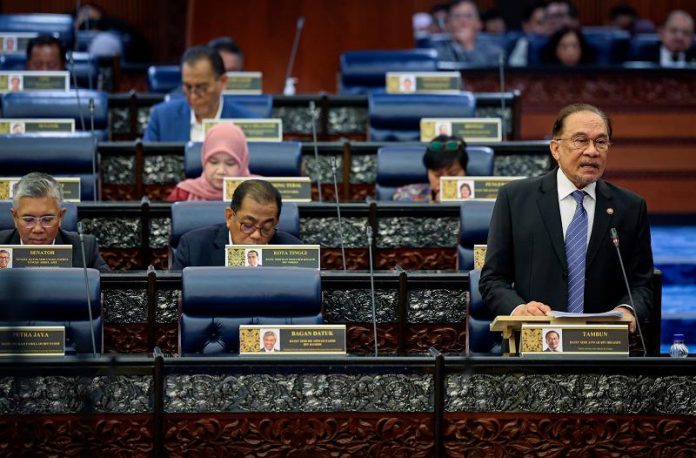KUALA LUMPUR: Prime Minister Datuk Seri Anwar Ibrahim said the government is considering revising the gross domestic product (GDP) growth forecast set in Budget 2025 after gaining more clarity from Malaysia’s negotiations with the United States (US) on the tariffs.
Describing the situation as dynamic, Anwar, who is also the Finance Minister, explained that it is highly likely the country will not achieve the GDP growth forecast for this year, which is between 4.5 per cent and 5.5 per cent.
“The Finance Ministry and Bank Negara Malaysia are looking into the impact of the tariffs and will review the GDP growth forecast once there is more certainty about the implementation of President Trump’s tariff policies and the results of negotiations with the US,” he said during a Special Parliamentary Meeting on the US tariffs today.
The Prime Minister noted that, as Malaysia practices an open economy, the issue is a matter of concern given the impact of US policies on the global economy.
“We must acknowledge that, based on current figures, the country faces a more moderate economic outlook, and that the global economic growth in 2025 is expected to be more moderate compared to earlier projections,” he said.
Anwar cited the International Monetary Fund’s (IMF) World Economic Outlook for January-April 2025, where the global growth was revised to 2.8 per cent from 3.3 per cent.
He added that the growth forecasts for the US, Indonesia and Thailand were also revised downward from earlier estimates — the US to 1.8 per cent (from 2.7 per cent previously), Indonesia to 4.7 per cent (from 5.1 per cent), and Thailand to 1.8 per cent (from 2.9 per cent).
“Malaysia’s growth projection has also been revised to 4.1 per cent from 4.7 per cent. These new expectations point to more moderate growth across all countries, including Malaysia,” said Anwar.
He said the MADANI Government has acted proactively after the US announced the implementation of its import tariffs on April 2, including the establishment of the National Geoeconomic Coordination Centre (NGCC) on April 4.
The integrated platform, which involves various agencies, has been monitoring, assessing and coordinating responses to changes in the global trade landscape, tariff shocks and non-tariff barriers.
Anwar, who chairs the NGCC, said it has convened three times so far to ensure strategic industries, exporters, and economic planning remain resilient and competitive amid uncertainties.
In addition, he said the ASEAN Geoeconomic Task Force has also been established to strengthen policy coordination and monitoring at the ASEAN level, following a special meeting of ASEAN Economic Ministers on the US reciprocal tariffs.








